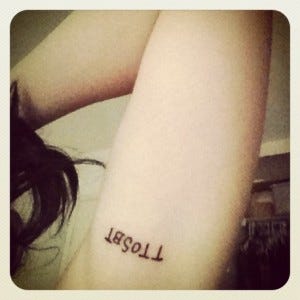Craft
Letters from a Young Whatever #5: Supernatural Bread

It’s rather funny — the topic of my previous column — considering what happened next in my life.
There’s this Simone Weil quote I’ve been obsessed with lately:
Man only escapes from the laws of this world in lightening flashes. Instants where everything stands still, instants of contemplation, of pure intuition, of mental void, of acceptance of the moral void. Whoever endures the moment of the void either receives the supernatural bread or falls. It is a terrible risk, but one that must be run — even during the instant when hope fails. But we must not throw ourselves into it.
What happened to me next was essentially this: I went into the void, and I received the supernatural bread. This reward did not come without consequences. Nor does it ever.
I am being cryptic here, but only because this is not the time or place to give a detailed explanation of what happened. I will only tell you what you need to know, and that is the parts that correspond to my writing.
In a moment of clarity — the type that is only possible when one reaches the depths of the void — I realized that while I am a writer through and through, I am most certainly not a novelist. This realization brought me no pain.
I was in a heightened state of being, where I was entirely losing my shit (and by ‘shit,’ I mean ‘mind’). During this, I looked back at my novel-in-progress. I had written exactly ninety-nine pages, and this had taken me exactly six months. I looked at these pages, and realized that my book would be mediocre at best. I simply could not plant myself into my life at seventeen in a way that would enable my book to be great. I could not do this because of something I explained in my previous column, which is, to put it briefly, that my memory is shit. And while my imagination is a good one, it is only good enough to create a world that is semi-compelling. I can no longer allow myself to create something that is merely semi-compelling. I cannot allow myself to spend hours and years on a book that is mediocre.
Besides a fabulous imagination, novel writing requires consistency and diligence. In this form, slow and steady wins the race. Unfortunately, my mind is neither slow nor steady; it is erratic, sometimes bursting, sometimes dormant. I am uneven by temperament; my diligence waxes and wanes. Immediately preceding my recent downpour of madness, I was brought a realization seemingly gifted by the divine. I am not a novelist — at least not right here, right now.
Supernatural bread.
There is a saying from Shakespeare that twelve-step programs have adopted, I’m sure you’ve heard of it: To Thine Own

Self Be True. I got it tattooed on my arm a few days ago, but the tattoo says this cryptically; it reads TTOSBT (my plan is to tell people it means Tit Time Or Sausage Butt Time). I got it because a twelve-step program saved my ass just now, when my mind had taken me to the scary place and beat me up. I also got it because I’ve found what is most important to me, in my life and in my writing, and that is brutal and complete honesty. My truth. I want to peel back the facades that life requires us to build, and I want to display the guts underneath, in all of their ugliness and glory. I want to be true to myself, always, and you know what? Fuck the consequences. Because I know there will be consequences.
Writing about being crazy using fiction is different than writing about being crazy using nonfiction. The most difficult part about being crazy — and about being an addict, as well — is that you have to spend so much time deliberating the authenticity of your voice: Is it your true self speaking, or your illness? It’s exhausting, not being able to trust yourself. And this logic applies to the way society views me, a crazy person — not just to how I view myself. “You’ve stopped writing your novel?” my friends have said to me. “Are you sure you should be making a decision like that now?”
(“Now” is a nice way to say “when you’re still crazy.”)
If you listen hard enough to the thoughts in your head, you realize that your true self speaks much more loudly and clearly than your illnesses. But it’s difficult to explain that no, this wasn’t your crazy voice talking when you realized you couldn’t write a novel. It wasn’t your crazy voice that told you to get that weird tattoo. It was your true voice. The difficulty here is the fact that there are two different voices, and both of them live in your head. If you’ve been diagnosed with a mental illness that oftentimes makes you delusional, speaking about voices in your head is something you’re going to want to stay away from.
The difference between writing about this subject matter from fiction vs. nonfiction is much the same. If I were writing a novel about being crazy — even if I admitted that it was autobiographical — I could always hide behind the illusion that maybe those crazier moments were only made up. But in nonfiction, I make myself culpable for every word, every brushstroke. If being diagnosed as crazy takes away your credibility, then opening up about every aspect of being crazy makes you more vulnerable.
And being vulnerable isn’t comfortable for anyone. Being vulnerable is especially uncomfortable for former drug addicts, who have spent their entire lives hiding under anything they could rummage together in order to barrage themselves into a safe little cave where they imagine they will never have to be vulnerable ever again.

I am incredibly, horribly uncomfortable when I am vulnerable. But vulnerable is where the good stuff is buried — the things that no one talks about.
Yet paradoxically, the things that no one talks about are the things that make us ourselves the most. If you want to be true to yourself, you have to be vulnerable. I’m sure you’ve all heard that you should only write about the things that scare you. If I want to be true to myself, I have to talk about exactly what it is like to be crazy, because doing this scares me more than anything else in this world. And I have to attach my own name* and experiences to it, because doing so will make me that much more vulnerable. I have to open my ribcage and bleed out my heart.
I wanted to be a novelist, I really did. I wanted to do it to prove to myself that I was a hard worker, that I was a Real Writer. Some inner lit snob inside of me whispered and told me that fiction was where it’s at, in terms of ‘real art.’ That voice told me that memoir-writing is lesser than, not good enough, a genre for celebrities and former journalists. I don’t even know if what I’m working on now could be considered a memoir, but what I do know is this: That lit snob voice? She stems from the same little dark spot in my heart as my two illnesses. And that chick needs to be bled out. She needs to shut the fuck up.
The creative process is exactly that: a process. Unlike most processes, it never treads neatly from step A to step B. Like my mind, the path is erratic; its clarity waxes and wanes. But, if you step closely and carefully follow it down, it will always lead you to The Truth.
However, creative people are collectors of objects. We take things we’ve seen and heard and thought about, and place

them like rocks along our path. Sometimes the stones help us; they pave our way. But sometimes they are simply boulders, unwieldy and jagged, obstructing the road and making it harder to follow. It’s difficult and it takes time to tell the two types of rocks apart, hence the creative process.
I brought to my process my preconceptions of what it meant to be a writer. I also brought to it the experience in my life that was the most perplexing, and the one I thought made me the most me. I brought to it my love of novels, my respect for novelists, and my own silly idea that I was one. My foundation — my sanity — had to be shaken up and entirely torn down for me to tell the stones from the boulders. I flung the boulders away and split them open, and I found out that they were complete and utter bullshit. It wasn’t easy to do this. This was an act that required destruction. But from this destruction emerged my true self, my very own supernatural bread.
PREVIOUSLY: Letter #1: Leaving the City I Love / Letter #2: I have feelings for you, Cat Marnell / Letter #3: I’m a Writer and I’m Better Than You / Letter #4: Why I Write Fiction
***
— Juliet Escoria is a writer living in Southern California. Sometimes you can find her here.
* Author’s note: I use a pen name because what I write about could get me in trouble at my paying job. My real name is easily traceable through my pen name. I did this on purpose.









